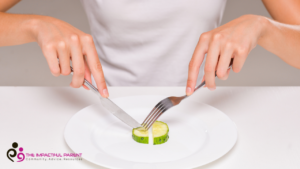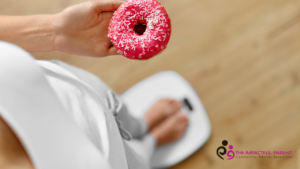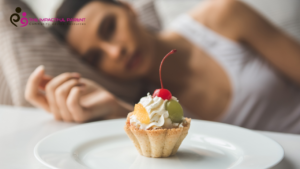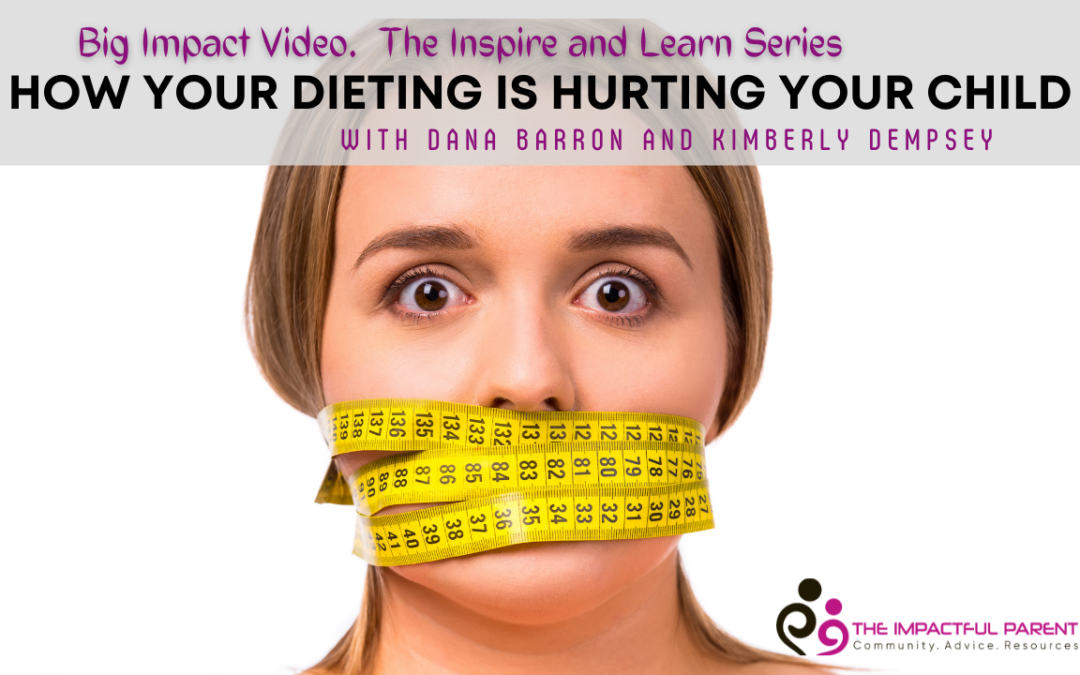Preventing Adolescent Eating Disorders Starts With YOU.
This interview with Dana Barron and Kimberly Dempsey is more than informative, it is powerful! Kimberly talks about her personal story with food and the struggles she has had for many years with body image and dieting. Dana Barron continues the conversation by telling the audience HOW they can get help. Dana discusses “Intuitive Eating” and how parents need to change their views of food to create a healthier home life for their children.
Transcript for Preventing Adolescent Eating Disorders:
Kristina: Welcome parents to The Impactful Parenting Inspire and Learn series, where real parents come on and tell their real stories of inspiration and learning because a wise man learns from his mistakes, but a wiser man learns from other people’s mistakes. Today we’re going to learn from Kimberly Dempsey and Dana Barron. Kimberly Dempsey is a former client and now director of marketing for Wellness lately. She has an amazing story that she will tell us about body image and her struggle with dieting since childhood. Also, today, Dana Barron, co-founder of Wellness Lately, will give us information about how we can help our relationship with food to be a healthier parent.
Let’s get started with Kimberly’s story.
Kimberly: I think I have a story that’s shared by many women all across the world. I came from a household that had a very weight-centric mother. She was always very concerned about keeping her weight controlled and maintaining a certain image. She passed down that mentality to me at a very early age. We were constantly monitoring my body size, putting me on diets, and I was very young. I was only about eight years old.
I remember going on Weight Watchers. I was taught that my body was all wrong. My body was something that I needed to control and work on. My natural body was not good enough. I needed to constantly be working on my body. From eight years old on, this continued. I can’t even count the diets. I’ve been on Jenny Craig, Keto, Paleo, Whole 30, Counting Macros, and the list goes on. I would say that probably 50% of my waking hours were spent thinking about food. What I was going to eat, what I ate, what I wanted to make sure I didn’t eat, etc. It was stripping away little pieces of my life. Food was constantly on my mind and taking me out of the present.

Preventing Adolescent Eating Disorders
When I became pregnant, I gained a lot of weight. I used pregnancy as an excuse to take a break from dieting and eat whatever I wanted. It was like an extended binge.
After pregnancy, I just continued going on and off eating. I was restricting my food. I was binge eating from time to time. I felt horrible, and I felt physically uncomfortable. I thought I was mentally a strong person, but I had this ball and chain I was carrying through my whole life.
After I had my daughter, the dieting started to really get to me. “Why can’t I accept myself for how I am?” I realized that diets never sustainably worked for me. In addition, binge eating was scary. It was scary to feel out of control around food, not be able to have certain foods in my house, and not go to a social event like a cookout.
Eventually, I had a pivotal moment of realization. My daughter was about 5 years old. She was becoming very observant as to what I was doing. She saw that mommy was always eating something different than the family. She saw that Mommy had mood swings and that mom was super unhappy when she was putting on her clothes. My daughter was watching me and learning to hate food through my example. I always wanted to be the kind of mom teaching my daughter how to be strong, love herself, and be powerful. I didn’t want her to have the same body image issues that I had. I wanted to teach her to accept her body and overcome the unnecessary pain from chronic dieting. So, in the end, my pivot came from wanting to be a better role model for my daughter. My motivation was to not pass this down to my children. That is when I decided to get help.
Kristina: Congratulations on making those big choices and being a good model for your children. You are brave, and I am sure the journey wasn’t easy. Can you tell me more about that journey? What was the process of becoming an intuitive eater?
Kimberly: Well, step one was for me to realize that I needed help. Nothing I was trying was working sustainably. Then a friend put me in touch with this company, Wellness Lately, that focuses on teaching the self-care framework called intuitive eating. Intuitive eating is getting back in touch with our own innate hunger and fullness cues and learning how to choose foods that satisfy you physically and mentally. The program teaches you to eat when I’m hungry and stop when you’re full. I learned to seek foods that I want to eat instead of following a plan. I also started listening to their podcast. Wellness Lately has an awesome podcast, and quite honestly, I wasn’t ready quite yet. The thought of stopping diets was terrifying for me. I listened to their podcast for about eight months and bought a book on intuitive eating before taking the plunge to find out more. That’s when I joined their Food Freedom Academy, which Dana can tell you about.

Preventing Adolescent Eating Disorders
Kristina: Do you feel any resentment toward your mother for the mindset that she instilled in you as a young child?
Kimberly: It’s a really great question, and my honest answer is I felt so much resentment growing up. I didn’t understand why she did this to me. I did believe, at my core, that she thought my body was wrong. Now I understand that my mother was just a student of diet culture, which is the culture we live in. The structured diet like Weight Watchers and Jenny Craig, and the Nutrisystem were popular in the 80s and very influential. I understand now that my mother was trying to do the best thing to protect me from being a part of what’s a very stigmatized group. Overweight people in America is a real systematic problem. She didn’t do this out of ill will towards me. My mom thought she was doing the right thing. I have compassion for her because, unfortunately, my mother is still in it. She will be going to her Weight Watchers meetings for her whole lifetime. I am no longer mad at her, but instead, I empathize.
Kristina: Let’s switch gears and hear more about this program. Dana Baron, thank you for being here. Dana, tell us a little bit more about what you do.
Dana: At Wellness Lately, we help women break out of the diet cycle and make peace with food in their bodies so that they can move on to bigger and better things in their lives. The statistics show us that the average woman who diets spends 50 to 60% of her time thinking about food and her body. We help women break out of the diet mentality that they’ve been living in for so long, and we help them stop battling food in their bodies every day.
Kristina: I think some women do not even know that there might be a problem. How do you know if you have an unhealthy relationship with food and your body?
Dana: Our definition of disordered eating includes all dieting. But this doesn’t cause a problem for everyone. Some people can diet their entire lives and be fine. However, when you are constantly thinking about food, worrying about your body, and feeling out of control around food, that is a telltale sign that something is off. A normal, healthy, balanced relationship with food won’t be emotionally fraught. There shouldn’t be any guilt and shame around eating. Suppose you think about food in terms of earning it or compensating for it, or punishing yourself over it. In that case, that is a problem also. Feeding yourself should not be difficult. Most women know when they reach that place where they just can’t do it anymore and know they need help.

Preventing Adolescent Eating Disorders
Kristina: Parents need to watch for those warning signs in their children as well. If you see your child struggling with food, it may also be time to get them help also.
What is the most important thing that you think that parents could do to ensure that they don’t pass down these negative views about eating and body image, just like in Kimberly’s story?
Dana: I think it’s investigating your own relationship with food. The most impactful thing you can do is heal your own stuff around food and body, because like we said before, kids don’t necessarily do what you tell them; they see how you treat yourself, how you relate to food, whether our mom enjoys dinner if you punish yourself with exercise, the way you speak to yourself, and the way you talk about food being good or bad. It’s really investigating your own stuff so that you role model the right mindset.
Kristina: What do you think step one is that parents can do today to start getting onto that road of a more intuitive eating cycle?
Dana: If you are dieting at home, you should stop. A diet-affirming household is usually a key component of children’s relationship with food. So, if you are actively dieting and body shaming, fat-shaming, and all of that stuff in your own home, then we need to correct that.
Kristina: What are the next steps after that? How do people learn more about what you do?
Dana: Yes! Get support. Book a breakthrough session with one of us for free. We work with women to investigate their belief systems around food. We are open to speaking about body image, and this is really what it comes down to. Women wouldn’t struggle with food if they didn’t believe that their bodies were wrong. We love working with women to heal their relationship with food through allowing all foods and turning to internal cues versus external rules and making peace with certain demonized foods in the past. There are 10 principles of intuitive eating that we would walk you through and support you.
Kristina: How can the audience contact you for help?
Dana: wellnesslately.com
We also have a wonderful free masterclass that will help you start to shift your mindset and give you support. Go to wellnesslately.com/masterclass.
And suppose you want to speak to one of us. In that case, we do free breakthrough sessions for anybody who wants to investigate their relationship with food. No strings attached. We’ll just get on the phone with you and see what’s not working and how we can help you start moving forward. You can schedule one of those at www.wellnesslately.com/apply.
Kristina: Awesome, thank you so much. I know that there are women out there who will be able to reach out to you and get the help they need.
If you have an inspiring story and want to share your story with the audience so that others can learn from you, please go to theimpactfulparent.com/work-with-me.
——–Preventing Adolescent Eating Disorders———–
What to do next:
- Follow The Impactful Parent on social media if you don’t already! Facebook, Instagram, LinkedIn, & Pinterest
- Subscribe to the PODCAST and/or the YOUTUBE CHANNEL! Podcast link & YouTube link
- Check out the official website of The Impactful Parent for FREE RESOURCES, parenting classes, mom’s groups, and so much more! Click here to check it out!
- Discover how you can work with Kristina! Sign up for a FREE 30-minute discovery call! Click here to find a time that works best for you!

